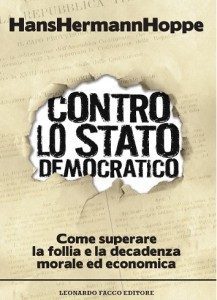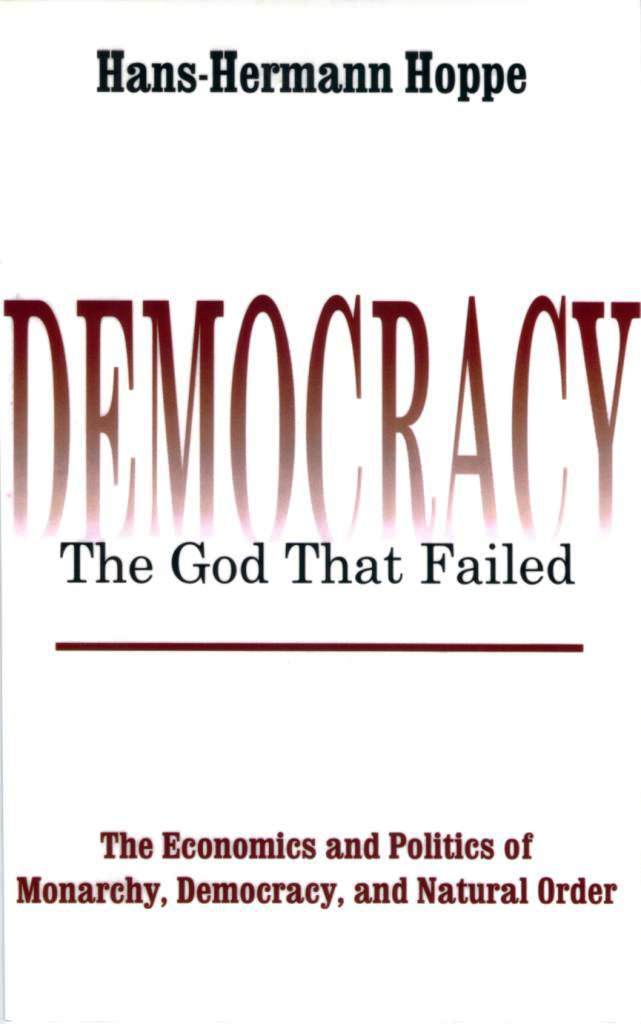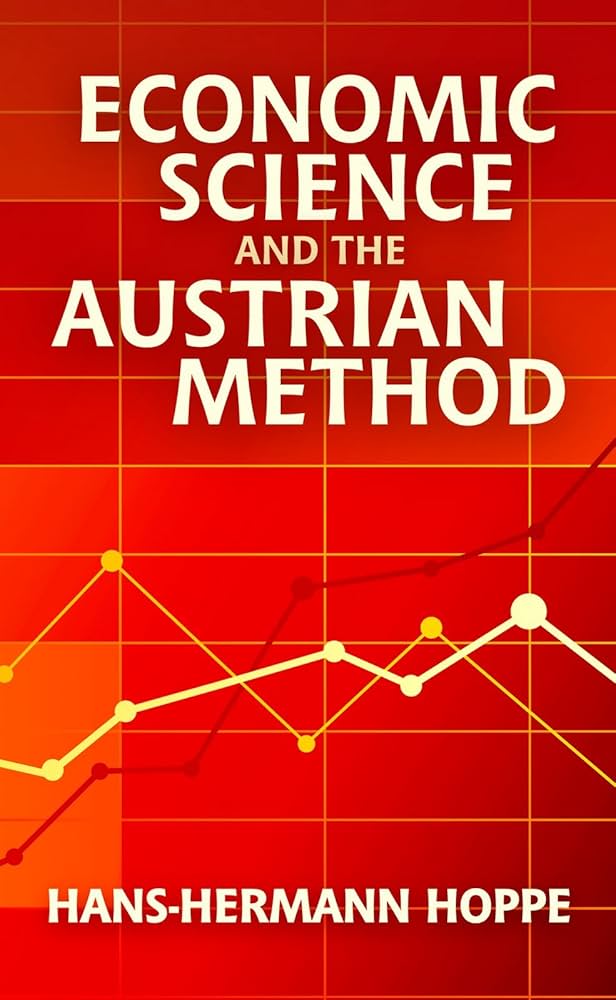 Chapter 4 of Professor Hoppe’s Theory of Socialism and Capitalism, “Socialism Social-Democratic Style,” has been published in the Swedish magazine Svensk Linje, no. 1, Spring 2016 (on pp. 44–59). The entire issue is online at https://issuu.com/svensklinje/
Chapter 4 of Professor Hoppe’s Theory of Socialism and Capitalism, “Socialism Social-Democratic Style,” has been published in the Swedish magazine Svensk Linje, no. 1, Spring 2016 (on pp. 44–59). The entire issue is online at https://issuu.com/svensklinje/
 The following Italian translations are now available online: From Aristocracy to Monarchy to Democracy and What Must be Done. The Italian translation is CONTRO LO STATO DEMOCRATICO ED A FAVORE DELL’INDIPENDENZA.
The following Italian translations are now available online: From Aristocracy to Monarchy to Democracy and What Must be Done. The Italian translation is CONTRO LO STATO DEMOCRATICO ED A FAVORE DELL’INDIPENDENZA.
 A German translation of Economic Science and the Austrian Method (1995) is now available: Ökonomik als Wissenschaft und die Methode der Österreichischen Schule.
A German translation of Economic Science and the Austrian Method (1995) is now available: Ökonomik als Wissenschaft und die Methode der Österreichischen Schule.
On Democracy, De-Civilization, and the Quest for a New Counterculture (Sept. 28, 2015), the written version of Professor Hoppe’s speech at the 2015 PFS Annual Meeting, Democracy, De-Civilization, and Counterculture, has been translated into German, as: Staat, Demokratie und Naturrecht: Entzivilisierung und Gegenkultur: Von Parasiten und Produzenten.
 Eine kurze Geschichte der Menschheit: Fortschritt und Niedergang, a German translation of A Short History of Man: Progress and Decline (Mises 2015), is now available on Amazon.de in paperback and kindle formats (translated by Robert Grözinger).
Eine kurze Geschichte der Menschheit: Fortschritt und Niedergang, a German translation of A Short History of Man: Progress and Decline (Mises 2015), is now available on Amazon.de in paperback and kindle formats (translated by Robert Grözinger).
 Krótka historia człowieka, a Polish translation of A Short History of Man: Progress and Decline (Mises 2015), is now available (translated by Łukasz Dominiak).
Krótka historia człowieka, a Polish translation of A Short History of Man: Progress and Decline (Mises 2015), is now available (translated by Łukasz Dominiak).
From Memories: Murray N. Rothbard (1926–1995) as Mentor and Teacher (PFS 2015).
This is the first presentation at the recently-concluded Tenth Annual Meeting of the PFS, Bodrum, Turkey (Sept. 10–15, 2015). This is a Roundtable Discussion and Q & A: “Memories: Murray N. Rothbard (1926–1995) as Mentor and Teacher”. With: Hans-Hermann Hoppe, Thomas DiLorenzo, Douglas French, Jeff Barr, Lee Iglody.
For others, see the links in the Program, or the PFS YouTube channel. Other lectures, presentations, and panels will be uploaded presently.
From: Hans-Hermann Hoppe, “Democracy, De-Civilization, and Counterculture” (PFS 2015)
This is Professor’s Hoppe’s main presentation at the recently-concluded Tenth Annual Meeting of the PFS, Bodrum, Turkey (Sept. 10–15, 2015).
For others, see the links in the Program, or the PFS YouTube channel. Other lectures, presentations, and panels will be uploaded presently.
Text at LRC: On Democracy, De-Civilization, and the Quest for a New Counterculture (Sept. 28, 2015)
Łukasz Dominiak is an adjunct scholar at Nicolaus Copernicus University in Poland, and a student of political philosophy. His research as a Summer Fellow at the Mises Institute involves the cultural aspects of a libertarian legal system, with an emphasis on the works of Hans-Hermann Hoppe.
 Teoria Socjalizmu I Kapitalizmu, a polish translation of A Theory of Socialism & Capitalism, is now available here from Mises Institute—Poland (translated by Paweł Nowakowski).
Teoria Socjalizmu I Kapitalizmu, a polish translation of A Theory of Socialism & Capitalism, is now available here from Mises Institute—Poland (translated by Paweł Nowakowski).
The translator’s Introduction is now available online: “Nowakowski: Od tłumacza „Teorii socjalizmu i kapitalizmu” Hansa-Hermanna Hoppego.”
See also „Teoria socjalizmu i kapitalizmu” Hansa Hermanna Hoppego początkiem nowej serii wydawniczej Instytutu Misesa (“The Theory of Socialism and Capitalism by Hans Hermann Hoppe begins a new series of the Mises Institute”).
Remarks upon presentation of the 2015 Murray N. Rothbard Medal of Freedom, Mises Institute, Auburn, Ala. (March 14, 2015).
A Short History of Man: Progress and Decline is nothing less than a concise revisionist history of man, skillfully presented by Dr. Hoppe. He addresses the rise of family structures, the development of private property, social evolution prior to the Industrial Revolution, and the rise of the state — all without regard for cherished myths. Dr. Hoppe will make you rethink your assumptions regarding man’s development in this engaging book.
http://mises.org/library/short-history-man-progress-and-decline
Audio File:
https://www.mises.org/library/short-history-man-progress-and-decline-0
On Man, Nature, Truth, and Justice | Hans-Hermann Hoppe
Prof.Hoppe’s speech at The Ludwig von Mises Memorial Lecture, sponsored by James Walker. Recorded at the Austrian Economics Research Conference at the Mises Institute in Auburn, Alabama, on 14 March 2015. Includes an introduction by Joseph T. Salerno.
The following is a video of Prof. Hoppe’s interview with Sons of Libertas.
Sons of Libertas & Prof. Dr. Hans Hermann Hoppe
The following is a video of Prof. Hoppe speaking at the Ludwig von Mises Seminar 2015 of Mises Institut Deutschland: “Praxeologie”
The following is a video of Prof. Hoppe speaking at the Ludwig von Mises Seminar 2015 of Mises Institut Deutschland: “Recht und Wirtschaft”












